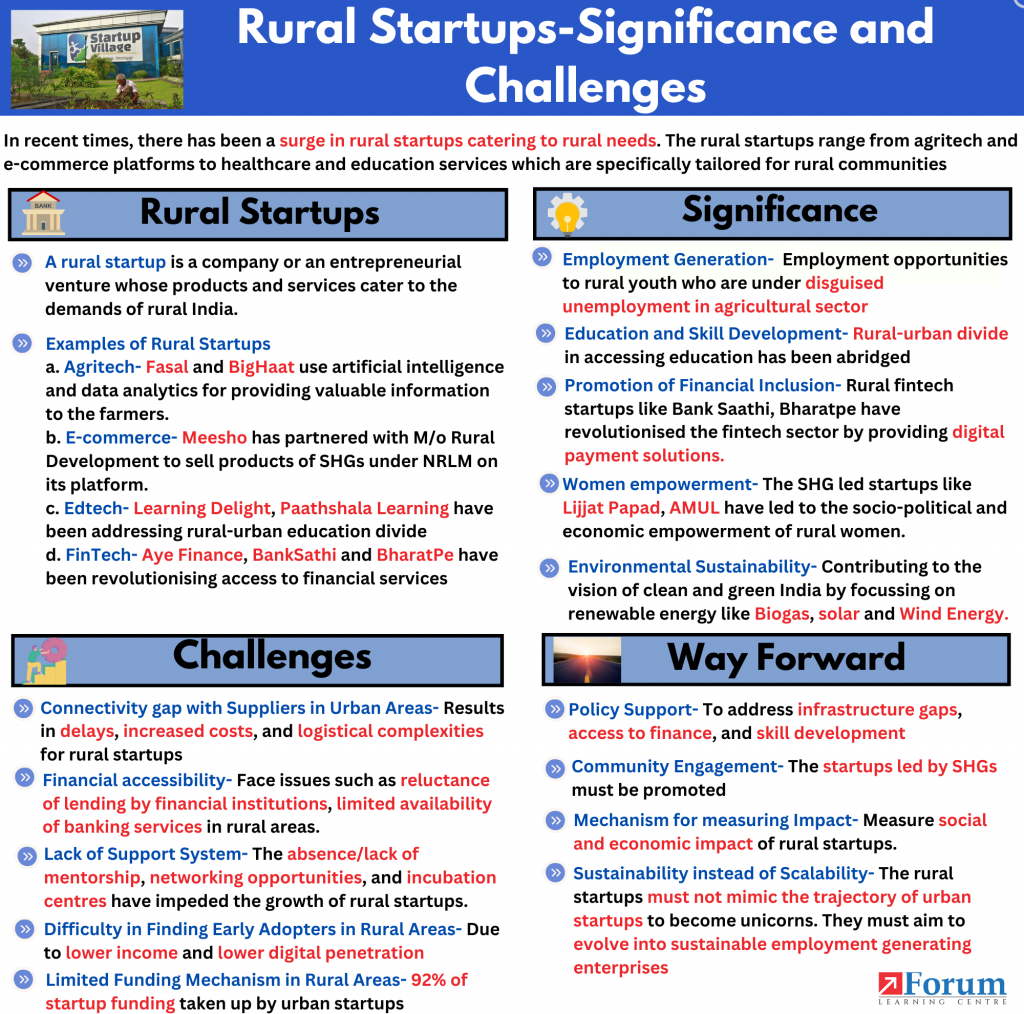ForumIAS announcing GS Foundation Program for UPSC CSE 2025-26 from 19 April. Click Here for more information.
ForumIAS Answer Writing Focus Group (AWFG) for Mains 2024 commencing from 24th June 2024. The Entrance Test for the program will be held on 28th April 2024 at 9 AM. To know more about the program visit: https://forumias.com/blog/awfg2024
In recent times, there has been a surge in rural startups catering to rural needs. The rural startups range from agritech and e-commerce platforms to healthcare and education services which are specifically tailored for rural communities. There has been an unprecedented growth in rural startups with a big government push since 2014.

What are Different Types Of Rural Startups Working in India?
A rural startup is a company or an entrepreneurial venture whose products and services cater to the demands of rural India.
Different types of rural startups in India
a. Founders based in urban areas, with solutions catering to rural areas- These entrepreneurs leverage their urban upbringing, access to resources and exposure to technology to create innovative solutions tailored to rural needs. For ex- Online platforms connecting farmers with markets, telemedicine services, and digital learning solutions for rural students.
b. Founders belonging to rural areas with solutions catering to rural areas- These entrepreneurs leverage their first-hand knowledge of local challenges, cultural nuances and community dynamics to develop solutions to rural needs. For ex- Ventures focussed on agricultural innovations, rural craft preservation and community centric initiatives.
c. Self Help Groups (SHGs)- Self-help groups (SHGs) represent a unique form of rural entrepreneurship, where individuals within a community come together to create a collective entity. For Ex- Anand Milk Union Ltd. (AMUL) is one of the most successful enterprise built on this model.
d. Micro, Small, and Medium Enterprises (MSMEs)- In India, more than 50% of the total 6.3 crore MSMEs are in rural areas. MSMEs in rural areas encompass a diverse range of enterprises, including manufacturing, services and trading.
Examples of Rural Startups In India
| Agritech | Fasal and BigHaat– Use artificial intelligence and data analytics for providing valuable information to the farmers. Ninjacart, DeHaat and Cropin– SaaS based agritech startups which connect farmers directly with buyers/retailers/storage facilities, reducing dependence on intermediaries and ensuring fair prices. |
| Food Processing | Intello Labs– Add value to raw agricultural produce, create marketable products and reduce post-harvest losses. Millet Magic, Slurrp Farm and Millet Amma– Encourage farmers to shift from traditional cereals to millets. |
| E-commerce | Meesho– This has partnered with M/o Rural Development to sell products of SHGs under NRLM on its platform. |
| Edtech & Skill Development | Learning Delight, Paathshala Learning Solutions and Classle– These Ed-tech startups have been addressing rural-urban education divide by bring education in local languages to remote areas through digital platforms |
| Health-tech | Medyseva, Gramin Health Care and Blackfrog Technologies– Offer remote consultations and overcome the lack of healthcare infrastructure in rural areas. |
| Renewable Energy | AgriVijay– Provide renewable energy products for farmers and rural households like solar, biogas, electric, hydro and wind energy. Agringenium Innovations Pvt. Ltd– Harness agricultural waste for clean energy production, thereby reducing dependence on traditional energy sources. |
| Handicrafts and Traditional Arts | Peetal, Shilpkaari and ThinkGudd– Provide training to rural artisans and help them in expanding their customer base and increasing income. |
| FinTech | Aye Finance, BankSathi and BharatPe– Revolutionising access to financial services offering a range of services such as investment platforms, Aadhaar Enabled Payment System (AEPS), digital ledger apps, and digital payment solutions. |
What is The Significance of These Startups?
1. Employment Generation- Rural startups provide employment opportunities to rural youth who are under disguised unemployment in agricultural sector (India’s agricultural sector productivity is abysmally low as it employs 50% of workforce but contribute to just 16% of GDP)
2. Education and Skill Development– Rural-urban divide in accessing education has been abridged by the emergence of rural ed-tech startups like Paathshaala.
3. Promotion of Financial Inclusion- Rural India has bore the brunt of financial exclusion, which has led to low levels of development. Rural fintech startups like Bank Saathi, Bharatpe have revolutionised the fintech sector by providing digital payment solutions.
4. Women empowerment- The SHG led startups like Lijjat Papad, AMUL have led to the socio-political and economic empowerment of rural women.
5. Environmental Sustainability- Rural startups have been contributing to the vision of clean and green India by focussing on harnessing renewable energy like Biogas, solar and Wind Energy.
What are The Challenges Faced by The Rural Startups in India?
1. Connectivity gap with Suppliers in Urban Areas- This connectivity gap results in delays, increased costs, and logistical complexities for rural startups and impacts their overall operational efficiency.
2. Financial accessibility- Rural startups face financial accessibility issues such as reluctance of lending by financial institutions, limited availability of banking services in rural areas.
3. Lack of Support System- The absence/lack of mentorship, networking opportunities, and incubation centres have impeded the growth of rural startups.
4. Difficulty in Finding Early Adopters in Rural Areas- The rural startups have faced issues of limited communication channels, lower income, and lower digital penetration to find early adopters in rural areas.
5. Limited Funding Mechanism in Rural Areas- Urban startups in Bangalore, Delhi and Mumbai have collectively accounted for 92% of startup funding over the past nine years. Rural startups often face ignorance on the part of the venture capitalists and angel investors.
Want To Know More About Different Topics-
What are The Government Schemes ?
| Atal Community Innovation Centres (under Atal Innovation Mission) | AIM’s ACIC initiative was launched in 2020. The objective is to create community innovation centres for rural entrepreneurs. Till now, AIM has established 14 ACICs across the country that have cumulatively supported more than 200 community-based startups. |
| Start-up Village Entrepreneurship Programme | Ministry of Rural Development is implementing Startup Village Entrepreneurship Programme (SVEP) as a sub-scheme under the DAY-NRLM with the objective of helping the rural poor to set up enterprises at the village level in non-agricultural sectors. A total of 1,97,168 enterprises across 23 States/UTs have been supported so far. |
| Skill India Mission | Under this mission, Ministry of Skill Development and Entrepreneurship (MSDE) has been delivering skills to rural youths across the country for helping them setup rural enterprises. |
| ASPIRE | This scheme is being implemented by Ministry of MSME aims to provide training and incubation support to prospective entrepreneurs in agro-rural sector through Livelihood Business Incubators (LBIs). |
What Should be The Way Forward?
1. Policy Support- Focus must be on framing policies that address the unique challenges faced by rural startups such as infrastructure gaps, access to finance, and skill development.
2. Community Engagement- The startups led by SHGs must be promoted through adequate policy support, as these lead to the development of local community.
3. Government and NGO Collaboration- There must be a collaboration with government agencies, non-governmental organizations (NGOs), and other stakeholders to align efforts and resources for rural startup development.
4. Mechanism for measuring Impact- Proper mechanisms must be established for measuring the social and economic impact of rural startups.
5. Sustainability instead of Scalability- The rural startups must not mimic the trajectory of urban startups to become unicorns. They must aim to evolve into sustainable employment generating enterprises, aligning with the broader vision of Vikshit Bharat.
Fostering an environment that supports and nurtures the growth of startups, particularly in rural areas, becomes imperative for realising the USD 10 Trillion milestone by the year 2030.
| Read More- The Economic Times UPSC Syllabus- GS 3- Indian Economy |





